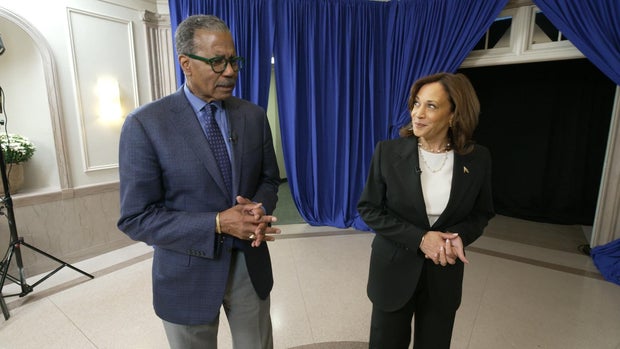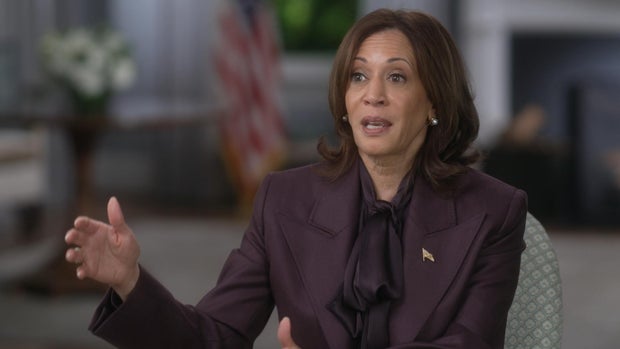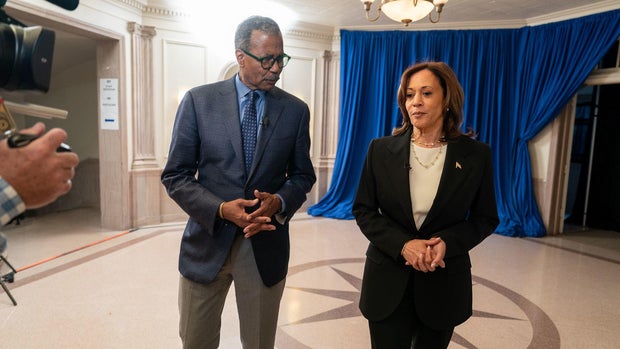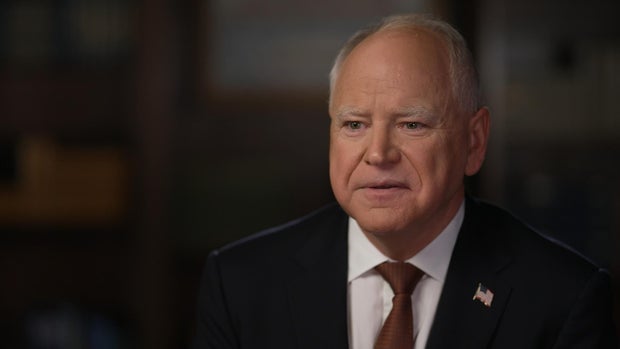CBS News
VP Kamala Harris makes the case for why she should be president | 60 Minutes

Kamala Harris has been a candidate for president for just two-and-a-half months and the post convention “honeymoon” is over. With the election just 29 days away, Harris and her running mate Minnesota Gov. Tim Walz face unrelenting attacks from Donald Trump, and the race remains extremely close.
We met the 59-year-old vice president this past week on the campaign trail and later at the vice president’s residence in Washington, DC. We spoke about the economy and immigration, Ukraine, and China, but we began with the escalating war in the Middle East. one year after the Hamas terror attack on Israel
Bill Whitaker: The events of the past few weeks have pushed us to the brink, if—if not into an all-out regional war in the Middle East. What can the U.S. do at this point to stop this from spinning out of control?
Vice President Kamala Harris: Well, let’s start with October 7. 1,200 people were massacred, 250 hostages were taken, including Americans, women were brutally raped, and as I said then, I maintain Israel has a right to defend itself. We would. And how it does so matters. Far too many innocent Palestinians have been killed. This war has to end.
Bill Whitaker: We supply Israel with billions of dollars in military aid, and yet Prime Minister Netanyahu seems to be charting his own course. The Biden-Harris administration has pressed him to agree to a ceasefire. He’s resisted. You urged him not to go into Lebanon. He went in anyway. Does the U.S. have no sway over Prime Minister Netanyahu?
Vice President Kamala Harris: The work that we do diplomatically with the leadership of Israel is an ongoing pursuit around making clear our principles.
Bill Whitaker: But it seems that Prime Minister Netanyahu is not listening.
Vice President Kamala Harris: We are not gonna stop pursuing what is necessary for the United States to be clear about where we stand on the need for this war to end.
Bill Whitaker: Do we have a–a real close ally in Prime Minister Netanyahu?
Vice President Kamala Harris: I think, with all due respect, the better question is do we have an important alliance between the American people and the Israeli people. And the answer to that question is yes.
While the war in the Middle East has dominated recent headlines, it’s the economy that most concerns American voters this election year, as always.
Bill Whitaker: There are lots of signs that the American economy is doing very well, better than most countries, I think. But the American people don’t seem to be feeling it. Groceries are 25% higher and people are blaming you and Joe Biden for that. Are they wrong?
Vice President Kamala Harris: We now have historic low unemployment in America among all groups of people. We now have an economy that is thriving by all macroeconomic measures. And, to your point, prices are still too high. And I know that, and we need to deal with it, which is why part of my plan—you mentioned groceries. Part of my plan is what we must do to bring down the price of groceries.
60 Minutes
Harris says she’ll press Congress to pass a federal ban on price gouging for food and groceries, but details are yet to be defined.
Bill Whitaker: You want to expand– the child tax credit.
Vice President Kamala Harris: Yes, I do.
Bill Whitaker: You want to give tax breaks to first-time home buyers.
Vice President Kamala Harris: Yes.
Bill Whitaker: And people starting small businesses.
Vice President Kamala Harris: Correct.
Bill Whitaker: But it is estimated by the Nonpartisan Committee for Responsible Federal Budget that your economic plan would add $3 trillion to the federal deficit over the next decade. How are you gonna pay for that?
Vice President Kamala Harris: OK, so the other econ- economists that have reviewed my plan versus my opponent and determined that my economic plan would strengthen America’s economy. His would weaken it.
Bill Whitaker: But–
Vice President Kamala Harris: My plan, Bill, if you don’t mind, my plan is about saying that when you invest in small businesses, you invest in the middle class, and you strengthen America’s economy. Small businesses are part of the backbone of America’s economy.
Bill Whitaker: But—but pardon me, Madame Vice President, I– the– the question was, how are you going to pay for it?
Vice President Kamala Harris: Well, one of the things is I’m gonna make sure that the richest among us, who can afford it, pay their fair share in taxes. It is not right that teachers and nurses and firefighters are paying a har– a higher tax rate than billionaires and the biggest corporations.
Bill Whitaker: But—but
Vice President Kamala Harris: And I plan on making that fair.
Bill Whitaker: But we’re dealing with the real world here.
Vice President Kamala Harris: But the real world includes—
Bill Whitaker: How are you gonna get this through Congress?
60 Minutes
Vice President Kamala Harris: You know, when you talk quietly with a lot of folks in Congress, they know exactly what I’m talking about, ’cause their constituents know exactly what I’m talking about. Their constituents are those firefighters and teachers and nurses. Their constituents are middle-class, hard-working folk.
Bill Whitaker: And Congress has shown no inclination to move in your direction.
Vice President Kamala Harris: I– I disagree with you. There are plenty of leaders in Congress who understand and know that the Trump tax cuts blew up our federal deficit. None of us, and certainly I cannot afford to be myopic in terms of how I think about strengthening America’s economy. Lemme tell you something. I am a devout public servant. You know that. I am also a capitalist. And I know the limitations of government.
Kamala Harris has been in government for decades; she was first elected San Francisco district attorney in 2003, then California attorney general, she went on to the U.S. Senate, and now vice president.
Bill Whitaker: A quarter of registered voters still say they don’t know you. They don’t know what makes you tick. And– and why do you think that is? What–what’s the disconnect?
Vice President Kamala Harris: It’s an election, Bill. And I take– it seriously that I have to earn everyone’s vote. This is an election for president of the United States. No one should be able to take for granted that they can just declare themselves a candidate and automatically receive support. You have to earn it. And that’s what I intend to do.
Bill Whitaker: Lemme tell you what your critics and the columnists say.
Vice President Kamala Harris: OK.
Bill Whitaker: They say that the reason so many voters don’t know you is that you have changed your position on so many things. You were against fracking, now you’re for it. You supported looser immigration policies, now you’re tightening them up. You were for Medicare for all, now you’re not. So many that people don’t truly know what you believe or what you stand for. And I know you’ve heard that.
Vice President Kamala Harris: In the last four years I have been vice president of the United States. And I have been traveling our country. And I have been listening to folks and seeking what is possible in terms of common ground. I believe in building consensus. We are a diverse people. Geographically, regionally, in terms of where we are in our backgrounds. And what the American people do want is that we have leaders who can build consensus. Where we can figure out compromise and understand it’s not a bad thing, as long as you don’t compromise your values, to find common-sense solutions. And that has been my approach.
But one issue that has proven impervious to compromise is immigration. Over the past four years, the Biden/Harris approach has been inconsistent, and Republicans are convinced immigration is the vice president’s achilles heel.
Bill Whitaker: You recently visited the southern border and– embraced President Biden’s recent crackdown on asylum seekers. And that crackdown produced an almost immediate and dramatic decrease in the number of border crossings. If that’s the right answer now, why didn’t your administration take those steps in 2021?
Vice President Kamala Harris: The first bill we proposed to Congress was to fix our broken immigration system, knowing that if you want to actually fix it, we need Congress to act. It was not taken up. Fast forward to a moment when a bipartisan group of members of the United States Senate, including one of the most conservative members of the United States Senate, got together, came up with the border security bill. Well, guess what happened? Donald Trump got word that this bill was afoot and could be passed and he wants to run on a problem instead of fixing a problem, so he told his buddies in Congress, “Kill the bill. Don’t let it move forward.”
Bill Whitaker: But I’ve been covering the border for– for years. And so I know this is not a problem that started with your administration.
Vice President Kamala Harris: Correct. Correct.
Bill Whitaker: But there was an historic flood of undocumented immigrants coming across the border the first three years of your administration. As a matter of fact, arrivals quadrupled from the last year of President Trump. Was it a mistake to loosen the immigration policies as much as you did?
Vice President Kamala Harris: It’s a longstanding problem. And solutions are at hand. And from day one, literally, we have been offering solutions.
60 Minutes
Bill Whitaker: What I was asking was, was it a mistake to kind of allow that flood to happen in the first place?
Vice President Kamala Harris: I think– the policies that we have been proposing are about fixing a problem, not promoting a problem, okay? But the–
Bill Whitaker: But the numbers did quadruple under your–
Vice President Kamala Harris: And the numbers today–
Bill Whitaker: –under your watch–
Vice President Kamala Harris: –because of what we have done– we have cut the flow of illegal immigration by half. We have cut the–
Bill Whitaker: But should you have done that–
Vice President Kamala Harris: –flow of fentanyl–
Bill Whitaker: –should you have done that–
Vice President Kamala Harris: –by half. But we need Congress to be able to act to actually fix the problem.
Bill Whitaker: You have accused Donald Trump of using racist tropes when it comes to Haitian immigrants in Springfield, Ohio, when it comes to birtherism, when it comes to Charlottesville. In fact, you have called him a racist and divisive. Yet Donald Trump has the support of millions and millions of Americans. How do you explain that?
Vice President Kamala Harris: I am glad you’re pointing these comments out that he has made, that have resulted in a response by most reasonable people to say, “It’s just wrong. It’s just wrong.”
Bill Whitaker: With so many people supporting Donald Trump, a man you have called a racist. How do you bridge that seemingly unbridgeable gap?
Vice President Kamala Harris: I believe that the people of America want a leader who’s not tryin’ to divide us and demean. I believe that the American people recognize that the true measure of the strength of a leader is not based on who you beat down, it’s based on who you lift up.
The Harris campaign has been hopscotching the country and with less than a month to go, the pace is picking up. The vice president told us, she’s lost track of how many states she’s visited.
Vice President Kamala Harris: How are you doing?
Bill Whitaker: I’m doing well.
Vice President Kamala Harris: You well?
We joined her on the trail late last week, in the crucial swing state of Wisconsin, in the town of Ripon, the birthplace in 1854 of the Republican Party.
And at a rally plastered with “country over party” banners, Harris appeared with staunch conservative Liz Cheney. As vice chair of the House January 6th Committee, Cheney became one of Donald Trump’s fiercest critics.
Liz Cheney: I have never voted for a Democrat, but this year, I am proudly casting my vote for Vice President Kamala Harris (applause)
That proclamation spurred a chant of approval from the crowd…
Bill Whitaker: Four years ago if someone had told you that you would be campaigning with Liz Cheney, what would you have said to them?
Vice President Kamala Harris: That’d be great. (laughter)
Liz Cheney: She’s really diplomatic. (laughter)
Bill Whitaker: Would you ever have thought that you’d be campaigning with Kamala Harris?
Liz Cheney: I hope that if you had said to me four years ago, “Our constitution is going to be under threat and it’s gonna be crucial for the parties to come together– and to support Vice President Harris because she’ll defend the rule of law”– I know I would’ve said, “That’s exactly what I’ll do.”
Whoever wins the presidency will take on a host of daunting challenges, especially beyond our borders. Back in Washington, Vice President Harris told us she’s determined the U.S must win the economic competition with China for the 21st century. And as for the war between Russia and Ukraine?
Bill Whitaker: What does success look like in ending the war in Ukraine?
Vice President Kamala Harris: There will be no success in ending that war without Ukraine and the UN charter participating in what that success looks like.
Bill Whitaker: Would you meet with President Vladimir Putin to negotiate a solution to the war in Ukraine?
Vice President Kamala Harris: Not bilaterally without Ukraine, no. Ukraine must have a say in the future of Ukraine.
Bill Whitaker: As president, would you support the effort to expand NATO to include Ukraine?
Vice President Kamala Harris: Those are all issues that we will deal with if and when it arrives at that point. Right now, we are supporting Ukraine’s ability to defend itself against Russia’s unprovoked aggression. Donald Trump, if he were president, Putin would be sitting in Kyiv right now. He talks about, “Oh, he can end it on day one.” You know what that is? It’s about surrender.
Bill Whitaker: A hard left turn here. But– you recently surprised people when you said that you are a gun owner and that if someone came into your house–
Vice President Kamala Harris: That was not the first time I’ve– I’ve–
Bill Whitaker: –they would get shot.
Vice President Kamala Harris: –talked about it. That’s not the first time I’ve talked about it.
Bill Whitaker: So what kind of gun do you own, and when and why did you get it?
Vice President Kamala Harris: I have a Glock, and– I’ve had it for quite some time. And– I mean, look, Bill, my background is in law enforcement. And– so there you go.
Bill Whitaker: Have you– ever fired it?
Vice President Kamala Harris: Yes. (laugh) Of course I have. At a shooting range. Yes, of course I have.
Democratic vice-presidential candidate Tim Walz was little-known outside Minnesota just two months ago. He didn’t exactly come from nowhere. He was a six-term congressman and now is governor of Minnesota, where he has championed abortion rights, gun control, and other progressive ideas. But it was calling former President Trump and Sen. JD Vance “weird” that may have landed him on the ticket.
60 Minutes
Bill Whitaker: Two months ago, you and Kamala Harris barely knew each other. Now, you’re running together, vying for the top offices in the land. It’s not possible that you agree on everything.
Gov. Tim Walz: Yeah.
Bill Whitaker: What have been some disagreements you’ve had since you became a team?
Gov. Tim Walz: Well—I—she’d probably disagreed with—she said, “Tim, you know, you need to be a little more careful on how you say (laugh) things,” whatever it might be.
Whatever it might be, Walz has been criticized for embellishing or telling outright falsehoods about his military record, and about his travels to Asia in the 1980s.
Bill Whitaker: In your debate with JD Vance, you said, “I’m a knucklehead (laugh) at times.” And I think you were referring to the time that you said that you were in Hong Kong during the Tiananmen Square unrest when you were not.
Gov. Tim Walz: Yeah.
Bill Whitaker: Is that kind of misrepresentation, isn’t that more than just being a knucklehead?
Gov. Tim Walz: I think folks know who I am. And I think they know the difference between someone expressing emotion, telling a story, getting a date wrong by–you–rather than a pathological liar like Donald Trump.
Bill Whitaker: But I think it comes down to the question of whether—whether you can be trusted to tell the truth.
Gov. Tim Walz: Yeah. Well– I can– I think I can. I will own up to being a knucklehead at times, but the folks closest to me know that I keep my word.
Walz proudly touts his record as governor of Minnesota, but it also has opened him up to criticism from his Republican opponents.
Bill Whitaker: Former President Trump says that you and your administration here in Minnesota has been dangerously liberal. Radical left, he calls it. So, what do you say to that criticism, that rather than leading the way, you and Minnesota are actually out of step with the rest of the country?
Gov. Tim Walz: President Trump may be referring to that – that our children get breakfast and lunch in school so that they can learn. He may be talkin’ about we have a paid family medical leave policy that was promoted by the business community. Donald Trump spends his time tearing down states rather than lifting up the things we do, the best of it. Donald Trump’s critiques of that, not only are they wrong, but I’m waiting for, “What—what is his solution? Here in Minnesota, we’re so optimistic, we walk on water half the year (laugh).
It was that kind of humor and candor that helped land Tim Walz the job as Kamala Harris’s running mate.
Bill Whitaker: Before you joined the– ticket, you called Republicans “weird.” And that’s sort of become a rallying cry for Democrats. Why do you think that label stuck?
Gov. Tim Walz: I was really talking about the behaviors. Being obsessed with people’s personal lives in their bedrooms and their reproductive rights, making up stories about legal –folks legally here eating cats and dogs, they’re dehumanizing. They go beyond weird because I said this: it becomes almost dangerous. Let’s debate policy in a real way and let’s try and find an objective truth again.
Kamala Harris and Tim Walz are in a full sprint to November 5th, hoping their arguments will give them a chance to cross the line ahead of Donald Trump and JD Vance.
Bill Whitaker: You are sitting here with us. The Trump campaign canceled an interview that they had agreed to, to participate in this broadcast. What do you make of that?
Vice President Kamala Harris: If he is not gonna give your viewers the ability to have a meaningful, thoughtful conversation, question and answer with you, then watch his rallies. You’re gonna hear conversations that are about himself and all of his personal grievances. And what you will not hear is anything about you, the listener. You will not hear about how he is gonna try to bring the country together, find common ground. And, Bill, that is why I believe in my soul and heart, the American people are ready to turn the page.
Produced by Marc Lieberman and Rome Hartman. Associate producers: Cassidy McDonald, Matthew Riley and LaCrai Scott. Broadcast associates: Mariah Johnson and Georgia Rosenberg. Edited by Warren Lustig and Craig Crawford.
CBS News
1 killed, 9 injured in shooting, fiery crash in Baltimore suburb of Towson, police say

BALTIMORE — One person was killed and nine others injured in a shooting and fiery crash in the Baltimore suburb of Towson Tuesday night, authorities said.
Law enforcement responded at around 7:15 p.m. in the 8500 block of Loch Raven Boulevard, Baltimore County Police Chief Robert McCullough said in a news briefing.
“It appears to be a mass shooting incident,” McCullough told reporters. “We have multiple persons who were shot. Right now, we are determining the circumstances and the conditions in this case.”
The first arriving officer found a vehicle on its side in flames near a funeral home, McCullough said, and then several gunshot victims were found in the area.
“There appears to be some type of incident that led to the vehicle crashing and catching on fire,” McCollough said. “Investigators are looking into the circumstances leading up to that.”
The name of the person killed and the manner of death was not released, nor were the conditions of the nine people injured. McCollough did not specify how many of the nine people injured were gunshot victims.
At this time, investigators believe this was an isolated and targeted incident, with no further threat to the community, he added. It’s unclear if any suspects have been arrested. There was no word on a possible motive.
“We will leave no stone unturned and we will dedicate every resource to this,” McCullough said. “We don’t generally see incidents like this in our community in Baltimore County. I assure you as your police chief that we will put all resources toward trying to clear this case.”
The Bureau of Alcohol, Tobacco, Firearms and Explosives was at the scene assisting police, as was the Baltimore County Fire Department.
“This is an incident that is shocking, particularly for those of us in Baltimore County,” said Baltimore County Executive Johnny Olszewski. “These types of incidents are unheard of here, so it really shocks the conscience. However, we want our residents to know that we are, as always, fully committed to ensuring that both our fire and police departments have the full support and all the resources they need from the Baltimore County government to ensure that they bring this investigation to a conclusion.”
Anyone with information is asked to call Baltimore County Police at 410-887-4636.
CBS News
Trump taps Herschel Walker for ambassador to the Bahamas
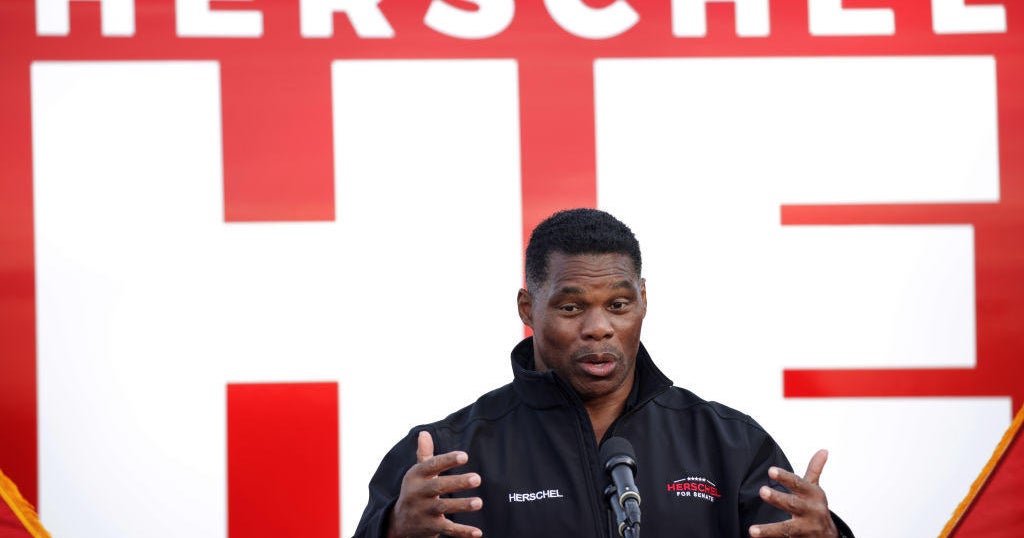
President-elect Donald Trump announced he will nominate Herschel Walker, the former football player whose 2022 Senate run was plagued by controversy, to serve as U.S. ambassador to the Bahamas.
“Herschel has spent decades serving as an Ambassador to our Nation’s youth, our men and women in the Military, and athletes at home and abroad,” Trump said on social media Tuesday night.
Walker would need to be confirmed by the Senate to assume the role. The Senate has not confirmed a U.S. ambassador to the Bahamas in over a decade. Former President Barack Obama had nominated Cassandra Butts for the role in 2014, but the Senate never even brought her nomination up for a vote, according to The Associated Press. She died in 2016.
Trump in his first term nominated Doug Manchester in 2017 for the ambassador role, but his nomination stalled for over two years. CBS News in 2019 also uncovered evidence of a possible pay-to-play scheme for the role. He eventually withdrew and Trump went on to nominate William Douglass in 2020. Douglass’ nomination was withdrawn by President Biden when he took office, and Mr. Biden in turn nominated Calvin Smyre, who has not been confirmed by the Senate.
Absent an official ambassador to the Bahamas, Kimberly Furnish currently serves in the role of Chargé d’Affaires.
Walker rose to national prominence as a star running back for the Georgia Bulldogs, winning the Heisman trophy in 1982. He spent his first few years of professional ball in the United States Football League before it folded, and then moved on to the NFL.
Walker reentered the national spotlight when, at Trump’s urging, he challenged Georgia’s Democratic Senator Raphael Warnock for his seat in 2022. The race featured several controversies, including two women claiming that Walker — who was running as an anti-abortion candidate — had paid for them to get abortions.
Walker denied both allegations.
In one instance, Walker admitted to writing a check for a woman who said he paid for her to get an abortion in 2009, but he said he hadn’t known what the money was for.
Another woman claimed Walker paid her to get an abortion while the two carried out a six-year relationship while he was married to another woman and playing in the NFL. During a news conference back in 2022, she said she couldn’t go through with the procedure when she went to get it herself, so Walker took her to a clinic in the Dallas area the next day and waited for her while she got the abortion.
“This was a lie a week ago and it is a lie today,” Walker said at the time following an interview the woman gave a week after the initial news conference.
Warnock would go on to win the election in a runoff after neither candidate received more than 50% of the vote on election day.
Aaron Navarro and
contributed to this report.
CBS News
1 killed, 9 injured in mass shooting in Baltimore suburb of Towson, police say

BALTIMORE — One person was killed and nine others injured in a mass shooting in the Baltimore suburb of Towson Tuesday night, authorities said.
Law enforcement responded at around 7:15 p.m. in the 8500 block of Loch Raven Boulevard, Baltimore County Police Chief Robert McCullough said in a news briefing.
“It appears to be a mass shooting incident,” Baltimore County Police Chief Robert McCullough told reporters. “We have multiple persons who were shot. Right now, we are determining the circumstances and the conditions in this case.”
The first arriving officer found a vehicle on its side in flames, McCullough said, and then several gunshot victims were found in the area. The name of the person killed was not released, and the conditions of the nine people injured was unknown.
At this time, investigators believe this was an isolated and targeted incident, with no further threat to community at this point, he added. It’s unclear if any suspects have been arrested.
The Bureau of Alcohol, Tobacco, Firearms and Explosives is at the scene assisting police, as was the Baltimore County Fire Department.
Anyone with information is asked to call Baltimore County Police at 410-887-4636.
This is a developing story and will be updated.


